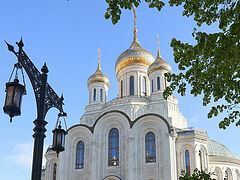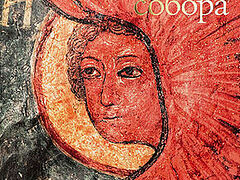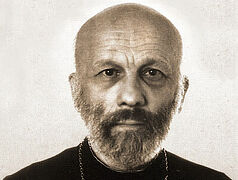Archimandrite Job (Gumerov) is the confessor of Sretensky Monastery. Today, Fr. Job speaks about a man who helped him to take the first steps in the Church and spiritual life.
—There is a saying, “Every beginning if difficult.” Tell us about your first steps as a Christian.
—I remember with gratitude how I got to meet Archpriest Sergiy Romanov1. He was born in 1947. His first degree was in Mathematics. Later, he graduated from the Moscow Theological Seminary and the Academy in the 1980s.
At the time, when I was spiritually ready to begin life as an Orthodox Christian, the Lord chose him to do this salvific work. We had neighbors in our apartment building in Tepliy Stan, a husband and wife, Vladimir Veniaminovich Bibikhin (1938–2004) and Renata (baptized with the name of Natalia) Alexandrovna Galtseva (1936–2021), and we became friends with them. Once, in April, 1984, I mentioned to Renata that I wanted to be baptized. With her natural disposition to do good, she immediately replied that she knew a priest and promised that she would talk with him. A few days later, she told me that Fr. Sergiy Romanov was ready to baptize us. At the time, he was serving at the Church of the Protection of the Mother of God on Lishchikov Lane.
It took place on April 17, 1984. Our spiritual birthday fell on Holy and Great Tuesday. Fr. Sergiy suggested choosing one among a few select names of saints. I chose the name of Athanasius in honor of the great hierarch, the Archbishop of Alexandria (†373; commemorated on January 18/31 and May 2/15). Our whole family became parishioners of the Protection Church.
As soon as that ancient church comes to mind, it evokes feelings that will likely never be relived again, just as you will never experience the joys of childhood again. I remember how that excitement grew anytime I walked along the noisy and always busy Taganskaya Square and then had to turn to the Nikolo-Yamskaya Street.
The church sits low, as if it had sunk into the ground. You walk up the wooden steps to enter a small narthex located under the bell tower. Everything is quite unsophisticated inside. But to me, everything seemed extraordinary at the time. I am convinced that anyone who has come to the Church only recently feels particular reverence about anything happening there. It is as if you are at the infancy stage of your faith. A child should be naïve and excited at first. Only in this way can he mature into adulthood.
Anyone who has recently come to the Faith would act like a child because he doesn’t want to speak about anything else with people, except the Faith and the miraculous revelations of the world he has just discovered. That’s exactly how the children, as they get to know the world, rush to share the joy that brightens up their lives. So, during the first years of my church experience, upon meeting a friend somewhere, I would hurriedly switch the conversation to spiritual discussions. It was the same in my interaction with co-workers.
—What distinct traits of Fr. Sergiy’s spiritual counseling do you remember in particular?
—We used to meet him outside the church as well. He often visited us at our home. We held conversations about the Faith and life in the Church. It helped me to arrive at a patristic understanding of the spiritual life and to avoid false spirituality.
Our conversations helped me to arrive at a patristic understanding of the spiritual life
—Following our baptism, Fr. Sergiy blessed our apartment. Not only did he celebrate the rite of blessing of a new home, he also explained that a Christian home should hold nothing that could be alien to Orthodoxy. “The home of an Orthodox Christian should be religious, too,” he said.
A rather large community was gradually formed around the figure of Fr. Sergiy. Not only did he care about everyone’s robust spiritual life, he also strove for his spiritual kin to continually grow in the Faith.
Fr. Sergiy strove for his spiritual kin to continually grow in the Faith
On May 19, 1985, Fr. Sergiy joined Elena and myself in Holy Matrimony at the Church of the Protection of the Mother of God. This Sacrament is beautiful not only because of its innermost meaning, by also as an extrinsic, sacral ritual. It took place during the days of Pascha. Anything that caught my eye inside the altar during the wedding instilled in me the spirit of joy and jubilation: the brightly lit stained glass icon of the Resurrection of Christ, the altar decked out in red, a beautiful candleholder, its outline resembling a sprawling bush. My mood was akin to the joyful feelings of the day of my baptism.
Only just now, as I was working on my memoirs, did I notice that we were united in marriage on the very day that would later become my Name Day in monasticism, May 19.
In 1987, Fr. Sergiy was transferred to the Church of the Vladimirskaya Icon of the Mother of God in the village of Vinogradovo (next to the town of Dolgoprudny). His large flock became parishioners of that church.
We travelled to Vinogradovo with our children. Our round trip usually took us more than five hours. The liturgy began at 8 am. We had to get up practically at 5 am. We had to wake up the kids, help them dress, and take them to the bus stop. Then we would travel for more than two and a half hours. I can’t remember a day when any of our children would fight it or refuse to go to the service.
Fr. Sergiy knew how hard it was for us to make these trips with the children every Sunday. That’s why he gave a blessing to attend services at St. Nicholas Church in Kuznetsy. Our family would often visit another church of the Holy Martyr John The Warrior on Yakimanka.
Fr. Sergiy made sure that the members of his community had regular confession and communion. He told me: “Try to have confession and communion no less than once every two weeks.”
He also wanted his spiritual children to be learned in theology. With his initiative, a theology class was formed in the 1980s. Only after many years could we grasp the meaning of certain events in our lives. When Fr. Sergiy Romanov organized a theological seminar for several members of our community, I had no idea that it would become a highly relevant preparatory stage of my future job as a lecturer at the Theological Academy and subsequent ordination.
Vladimir Yashchenko (now Igumen Cyprian), Alexei Uminsky (now Archpriest), Anatoly Lazorenko, Oleg Mramornov, Yury Arzhanov, and others took an active part in the seminar. We met regularly, listened to a report presented by one of the members, and then held a discussion. More often than not, it took place in our apartment in Tepliy Stan.
Fr. Sergiy would present a subject, suggesting that one of us make a report. I recall how I was invited to prepare a speech about the history of the dogma of the Holy Trinity. I based my report on the book by Anatoly Alexeyevich Spassky (1866–1916) called The History of the Dogmatic Movements in the Era of the Ecumenical Councils (in connection with the philosophical teachings of the time).” The first volume was titled “The Trinitarian Question: The History of the Dogma of the Holy Trinity.” I still remember many of the provisions of this fundamental theological work.
—How did you develop the desire to be a priest?
—At the end of the spring or the beginning of the summer in 1989, Fr. Sergiy told me: “You need to teach at the Theological Academy.” It caught me unawares. Teaching there seemed so far removed from my scientific work at the time that such a possibility hadn’t even crossed my mind, not even remotely. However, I treated his words with complete confidence. I see today that it was in line with the will of God and His plan for me. In August 1989, I was admitted as an instructor of the Moscow Theological Seminary and Academy. At first, with the blessing of Archbishop Alexander (Timofeyev); 1941–2003), I gave lectures once a week on the subject of “Christianity and Culture” simultaneously for all seminary courses and the Academy. Starting from 1990, I was tasked with teaching the seminary course on General Theology and the Old Testament Holy Scripture in the Academy. Fr. Sergiy would often inquire about my teaching experience.
At the end of May 1990, Fr. Sergiy Romanov told me that I needed to file a request to be ordained a deacon. Again, without hesitation or doubt, I replied: “I will.” Soon thereafter, I met Archbishop Alexander in the hallway and asked to see him. He asked: “Regarding what question?” “Concerning ordination.” He assigned a date. When I came, he immediately, without further ado, announced: “On Holy Trinity Day.” Then he added: “Arrive three days prior to that. Stay in the Lavra. Pray.”
In September, the second year of my teaching in the Academy had begun. Fr. Sergiy said that it was time to seek an ordination to the priesthood. Again, I agreed just as willingly. Some time passed. I received a call (it was on a Saturday around midday) from Archimandrite Benedict (Kniazev), the provost for discipline. He said: “Come today for Vigil service, you will be ordained tomorrow.” Immediately, I got ready and went. I was ordained on the Sunday before the Exaltation of the Life-Giving Cross, between two great feasts—the Nativity of the Most Holy Mother of God and the Exaltation of the Cross of the Lord—namely, on September 23. That’s how I became a priest in obedience. I see the will of God in this. I didn’t apply on my own.
Since my priesthood began so unexpectedly and I received no specific training, serving was a continuous struggle at first.
I thank Fr. Sergiy with warmth and gratitude, because he, as my spiritual father, helped me at the initial stage of my priesthood.







